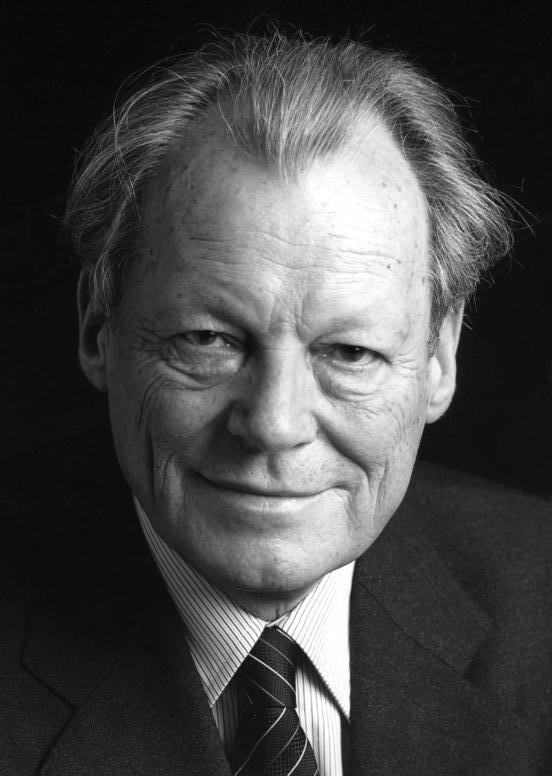
Willy Brandt
 Willy Brandt , né Herbert Ernst Karl Frahm le à Lübeck et mort le à Unkel, est un homme politique ouest-allemand.
Willy Brandt , né Herbert Ernst Karl Frahm le à Lübeck et mort le à Unkel, est un homme politique ouest-allemand.Membre du Parti social-démocrate (SPD), il est président de la Chambre des députés de Berlin de 1955 à 1957, bourgmestre-gouverneur de Berlin de 1957 à 1966, président du SPD de 1964 à 1987, vice-chancelier et ministre fédéral des Affaires étrangères de 1966 à 1969.
De 1969 à 1974, il est le premier social-démocrate à être élu chancelier fédéral, à la tête d’une coalition sociale-libérale avec le petit parti FDP, et ainsi le premier social-démocrate à diriger le gouvernement depuis 1930. Un autre social-démocrate, Helmut Schmidt, lui succède jusqu'à la fin 1982.
Son ''Ostpolitik'' a ouvert une nouvelle phase de relations avec la République démocratique allemande, la Pologne, la Tchécoslovaquie et lui vaut le prix Nobel de la paix en 1971. Informations fournies par Wikipedia
1
2
3
4
Livre
5
6
par Brandt, Willy
Publié dans: Tribüne : Zeitschrift zum Verständnis des Judentums (1984)91, S. 130-142
Publié dans: Tribüne : Zeitschrift zum Verständnis des Judentums (1984)91, S. 130-142
Localisation:
German Resistance Research Council 1933-1945 (Frankfurt/ Main)
Article
7
par Brandt, Willy
Publié dans: Tribüne : Zeitschrift zum Verständnis des Judentums (1979)71, S. 102-112
Publié dans: Tribüne : Zeitschrift zum Verständnis des Judentums (1979)71, S. 102-112
Localisation:
German Resistance Research Council 1933-1945 (Frankfurt/ Main)
Article
8
par Brandt, Willy
Publié dans: Sinti und Roma im ehemaligen KZ Bergen-Belsen am 27. Oktober 1979 (1980), S. 102-103
Publié dans: Sinti und Roma im ehemaligen KZ Bergen-Belsen am 27. Oktober 1979 (1980), S. 102-103
Article
9
10
11
par Brandt, Willy
Publié dans: Widerstand und Exil 1933 - 1945 (1985), Seite 270-280 year:1985 pages:270-280
Publié dans: Widerstand und Exil 1933 - 1945 (1985), Seite 270-280 year:1985 pages:270-280
Localisation:
Topography of Terror (Berlin)
Article
12
13
par Brandt, Willy
Publié dans: AVS-Informationsdienst (1992), 1, Seite 2-4 year:1992 number:1 pages:2-4
Publié dans: AVS-Informationsdienst (1992), 1, Seite 2-4 year:1992 number:1 pages:2-4
Localisation:
Topography of Terror (Berlin)
Article
14
15
Localisation:
The Wiener Library for the Study of the Holocaust & Genocide (London)
Livre
16
Livre
17
18
19
20
Livre

